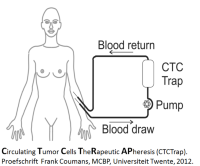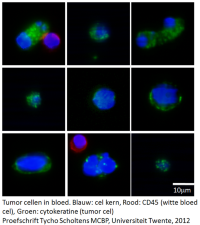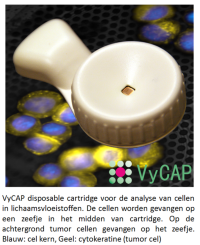Individual therapy for all cancer patients

In cancer patients, mortality is generally associated with metastases. The ability to detect “circulating tumor cells” (CTCs) in blood is crucial if we are to uncover the mechanisms that lead to metastases. In the future, it will be possible to screen all cancer patients for CTCs using a new and highly advanced technique known as “the CTCtrap”. The EU has awarded a six million euro grant to an international team led by Leon Terstappen, Professor of Medical Cell Biophysics at the University of Twente, The Netherlands (MIRA Institute). The CTCtrap is expected to be available in about four years’ time. According to Prof. Terstappen “This new technology will bring about a radical change in the treatment of cancer patients.”
The professor, who is the initiator and leader of this international project, had previously developed a technique for extracting CTCs from tubes containing 7.5 ml of blood. The various types of cancer cells revealed by this test are then analysed and counted. This information can be used to provide therapy that is better tailored to individual patients. This test suffers from the drawback that these tumor cells can be detected in only half of all cancer patients with metastatic disease. CTCs are present in the blood at very low concentrations, so these cells can usually only be detected in patients with cancers that are far advanced.

Leon Terstappen comments that “We also want to find out more about ‘that one cell’ that is left behind and that suddenly becomes active years after the primary tumor was treated. To this end, we need to examine a patient’s entire blood volume, and that is where the CTCtrap comes in. The advantage is that this technique can also be useful for patients with early stage disease.”
The project team consists of a consortium of eleven companies, universities, and research institutes from the United Kingdom, France, Italy, Estonia, Germany and the Netherlands. The project’s official date of commencement is September 1, 2012. The first two years will be devoted to the development of a prototype. This work will be carried out by four companies in cooperation with the University of Twente. During the final two years, clinical trials will be carried out in breast cancer patients and prostate cancer patients.

The CTCtrap
In addition to chemotherapy, cancer patients are increasingly being given target specific drugs. After a period of time, drug resistance may occur. A fresh tumour analysis is then needed to determine a new course of treatment. This often involves a biopsy, in which a tissue sample is taken. With the new CTCtrap technique, the patient receives a transfusion of their own treated blood (apheresis). CTCtrap is an acronym for Circulating Tumour Cells TheRapeutic APheresis. All of the patient’s blood (approximately 5.5 litres) is passed through a special filter, before being returned to their body. The filter traps any circulating tumour cells. Techniques are being developed to count these cells and to identify treatments to which they would be susceptible. This approach would allow treatment to be better tailored to the individual. In addition, this technique would enable physicians to treat their patients more quickly. This would increase efficiency and cut costs.
Prof. Terstappen explains: “Our initial approach was to reduce to a minimum the quantity of blood required to reach the right conclusions. I now take the view that we should be examining more blood, not less.”















